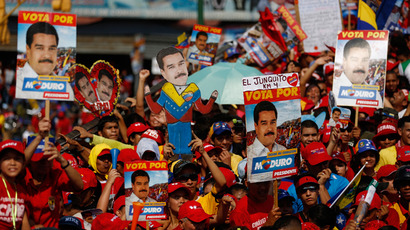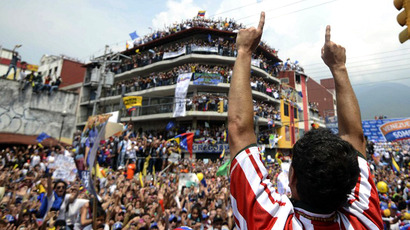Venezuela's Maduro accuses US Embassy of supporting violent protests
Venezuela's post-election crisis is growing deeper, with at least seven people killed during clashes between the opposition and police. President-elect Nicolas Maduro says he has proof that the US embassy is financing the ongoing protests.
The deaths occurred on Monday, when hundreds of protesters took
to the streets in various parts of Caracas and other cities. The
demonstrators blocked streets, burned tires, and fought with
security forces.
The fatalities include two people shot by opposition sympathizers
while celebrating Maduro's victory, state media reported. One
person died in an attack on a government-run clinic in a central
state. Two others, including a policeman, were killed in an Andean
border state, officials told Reuters.
"The most serious thing is that in these violent actions, seven
Venezuelans died," said Attorney General Luisa Ortega. She
added that 135 people have been arrested in suspected connection
with the violence.
According to Maduro, who spoke on Venezuelan television on Tuesday,
opposition candidate Henrique Capriles ought to be held responsible
for the violent demonstrations now taking place in Caracas and
throughout the country, which have already left sixty-one injured.
He also made pointed accusations at the US as having a key role in
the current instability.

“The Pentagon, the US State Department and the CIA govern the US. Here, in Venezuela, the people govern, ” stated Maduro.
Meanwhile, Capriles has called Maduro's victory "illegitimate" and called on supporters to peacefully protest the results. The Venezuelan election authority has refused to hold a recount, despite calls from the opposition.
But Latin American expert James Petras says the election was anything but fraudulent.
"In the case of Venezuela, there were 100 outside
international observers clearly recognized as objective judges who
observed the election process, observed the voting, and observed
the counting. It's a misnomer to say that this was a questionable
election," he told RT.
Maduro said on Tuesday that he will not allow the opposition to
hold a march in the center of Caracas planned for Wednesday, to
demand a recount of votes following Sunday's election. "It's
time for a tough hand," he said.

Speaking to supporters Tuesday, Capriles indicated that the
current clashes were the work of the incumbent party, and asked
that they not go out into the streets on Wednesday, stating that
those who do “only want violence.” He added that, according
to intelligence given to the opposition, the government had and
would attempt to “infiltrate” demonstrations.
Maduro has spoken out against
the opposition protests. "Where are the opposition politicians who
believe in democracy?"Maduro
said, blaming opposition candidate Henrique Capriles for the
violence.
His thoughts were echoed by Venezuelan Foreign Minister Elias Jaua. "Those who attempt to take with force what they could not acquire through elections are not democrats," he said.
And Petras agrees. "I think [the opposition] is trying to sabotage the government. They're not engaging in a peaceful protest. They're not raising legitimate questions. What they're doing is essentially calling into question election procedures," he said.

Sunday's election came after the death of Hugo Chavez last month. He named Maduro as his successor before he died.
Maduro won the election with 50.8 per cent of the vote against Capriles' 49.0 per cent.
According to anti-war activist Don Debar, the US is not exactly neutral in the Venezuelan election dispute.
"Venezuela is the nexus point for the standing up of the global South. The organizations ALBA, UNASUR, various structures that are being put in place for economic independence of, first, Central and South America, and then recently moves to bridge to Africa and moves to work in conjunction with the BRICS nations. It’s an alternate economic structure, global in its potential nature, that the United States sees basically as a foundational threat," he told RT.















